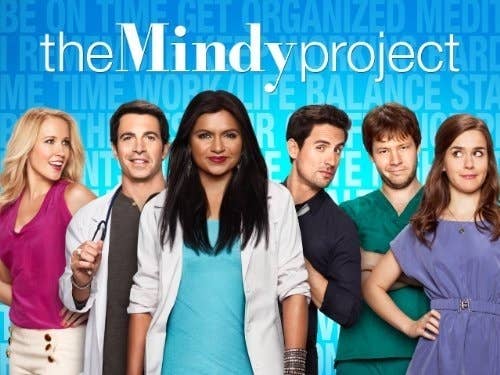
Before it premiered, excitement for FOX's The Mindy Project was high. Upon hearing about some of the show's writing staff hires, Jesse David Fox at Splitsider remarked, "OOOOOOOOOO.K., we get it, The Mindy Project, you're going to be great; stop rubbing it in our faces." Based on early clips, Matthew Zoller Seitz thought Mindy "looked like a winner." As a big fan of Kaling's work, I was pretty pumped for the new show as well, but then it actually premeired.
From the start the show had some serious tonal problems. The main character was fairly unlikable, uninterested in her job and rude to coworkers, but it still seemed as though we were meant to root for her. The show seemed to realize it needed fixing, and thus began the revolving door of cast changes. Richard Schiff out, Amanda Setton out. Stephen Toblosky in then out. Ike Barinholtz in. Anna Camp out but still kind of in. Mary Grill, the brothers Duplass and Kelen Coleman in every now and again. Beth Grant in, most inexplicably of all. But the show's most glaring flaw isn't that it hasn't found the right mix of characters, it hasn't given us a reason to give a damn about the vast majority of them.
During the early seasons of The Office the writers focused on four core characters, Michael, Jim, Pam and Dwight. They explored the intricacies of each relationship all the while slowly building the background characters, like Kaling's Kelly, into full-fledged people. By the show's third season, someone like Stanley could provide solid laughs from a tiny moment because the writers had made them each a unique personality that the audience related to.
On last night's episode, Mindy encountered a common sitcom trope epitomized in The Simpsons episode "Frank Grimes" and detailed in an "AV Club" article on the trend. Frank Grimes is the Platonic ideal of a "normal" character entering a show's world and being reviled at the insane behavior of our beloved characters. Only on Mindy, it happened in reverse. The main character encountered a group of "normal" strangers who reacted negatively to her abruptness. It might seem like a fun inversion of a common trope, but its telling of the problem at the root of what's wrong with The Mindy Project.
All the best examples on that AV Club list come from shows with multiple well-crafted characters. Friends, Cheers and It's Always Sunny to name a few of the standouts, are shows made up of diverse characters whose idiosyncracies combine to create coherent worlds. On Mindy, however, the titular character is the only character with any real depth.
Which is fine, a show anchored by a strong central character can be a good thing, indeed. Except that this show clearly wants to be about the entire ensemble. Why else would we spend so much of the episode with Mindy's "friends"? They're searching for her to make sure she has a good birthday, but why? We have no reason to understand why Mindy's friends find her abruptness so charming where these strangers found her rude. Why would they her birthday nice let alone search for her after she storms out of the party they threw her in a huff? At the end of the episode Mindy's in the hospital waiting room surrounded by people who, other than Danny and to some extent Morgan, are completely one-dimensional. It's supposed to be a happy ending, the whole gang hanging out, but this show hasn't earned it.
Character-based comedy takes work and time, something Kaling should've learned during her tenure in The Office's writers room. Unfortunately for The Mindy Project, its creator seems to believe she can skip all the groundwork necessary and cut right to the fun.

